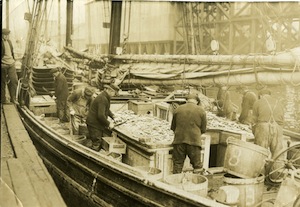You don't need Captain Obvious to tell you that fishing is hard work. It's a punishing profession that taxes you physically and mentally. It's no less harsh on the Alaska factory longliner Siberian Sea, but as Roger Fitzgerald notes in his column "In Search of the Simple Life" on page 9 in our April Yearbook issue, the vessel contains some perks you don't find on most fishing boats.
The longliner has creature comforts like staterooms, individual showers and a big screen TV. Not that the crew gets to take advantage of them much when the fishing is heavy (which is most of the time, Roger says). But I bet they help the crew members recharge their batteries and keep morale up.
Such luxuries weren't available on the schooner Mary F. Chisolm in 1906. Maybe if they had been it would've prevented the mutiny that our Boats & Gear Editor Michael Crowley writes about in his boatbuilding feature on p. 36 of our April issue.
The trouble occurred on a mackerel trip to the Virginia Capes. The Chisolm, fishing out of Gloucester, Mass., picked up extra crew in Portland, Maine, and skipper Sylvester Durost was a replacement for the regular captain. Durost apparently didn't play well with others, and drove the crew beyond its limits.
When Durost declared that rather than return to Portland as originally planned, they'd go "clear to the Bay of Fundy" in search of mackerel, it heightened animosity between the Portlanders and Durost. Confrontations started off as verbal and later became physical (resulting in Durost's breaking a crewman's arm when he swung an oar). Eventually the dispute led to 12 crew members tossing their oilskins and boots overboard as part of their effort to force Durost to return the ship to Portland.
By that point, not even having a big screen TV onboard would have helped calm things down. If there was a PlayStation, too, it might have helped ease tensions, but somehow I doubt it.
You can read the details in Mike's story, which also profiles an oar- and sail-powered Columbia River boat that become the dominant vessel of its era, and the Newfoundland, a diesel-powered New England side trawler built in 1930 that hedged its bets by also sporting a mainsail and foresail. It's great reading that provides a window into the fishing past.
Photo: The crew of the Mary F. Chisolm cuts up bait while the vessel is tied to the Portland docks five years after the mutiny occurred. File photo







